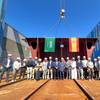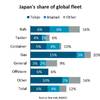Hapag Lloyd CEO: Trade Spats Could Dampen Shipping Growth
An escalation of tariff wars between China and the United States could dampen growth in international container shipping as operators pre-emptively brought forward business in the second half of last year, Germany's Hapag Lloyd said.
"Many customers tried to get their goods through to the U.S. ahead of time in second half 2018, creating additional growth," Rolf Habben Jansen, chief executive of the company that is the world's fifth biggest shipping liner, told reporters in Hamburg on Tuesday.
"That points to some business having been brought forward," he added.
However, with European activities being relatively stable, a direct crisis was not on the horizon, and only later this year would it be clear whether there would be sustained damage to business, he said.
Shipping is only slowly recovering from an oversupply of vessels that plunged the sector into an almost decade-long slump, forcing some players out of business and others to combine forces to seek economies of scale.
Elsewhere, freight rates were stable for the time being and further direction for the remainder of the year would emerge in the period from now up to the middle of May, Habben Jansen said.
On vessel supply, he said order books were low, representing 10 percent of the global fleet, with some scrapping activity being noticeable.
Preliminary results for 2018, due on Feb. 25, were likely to reflect growth in transport volumes above the market average and results should be "satisfactory", Habben Jansen said.
The company in November said a later peak season in 2018 was likely to lift full year earnings.
It targets earnings before interest and tax (EBIT) in a corridor of 200-450 million euros ($226.4-509.4 million).
Hapag Lloyd is introducing a surcharge mechanism this year to account for cleaner fuel rules starting in 2020 under the watch of the International Maritime Organization.
It was important to have "the right bunker clauses in all contracts", Habben Jansen said.
($1 = 0.8834 euros)
(Reporting by Jan Schwartz, writing by Vera Eckert, editing by Kirsten Donovan and Emelia Sithole-Matarise)















